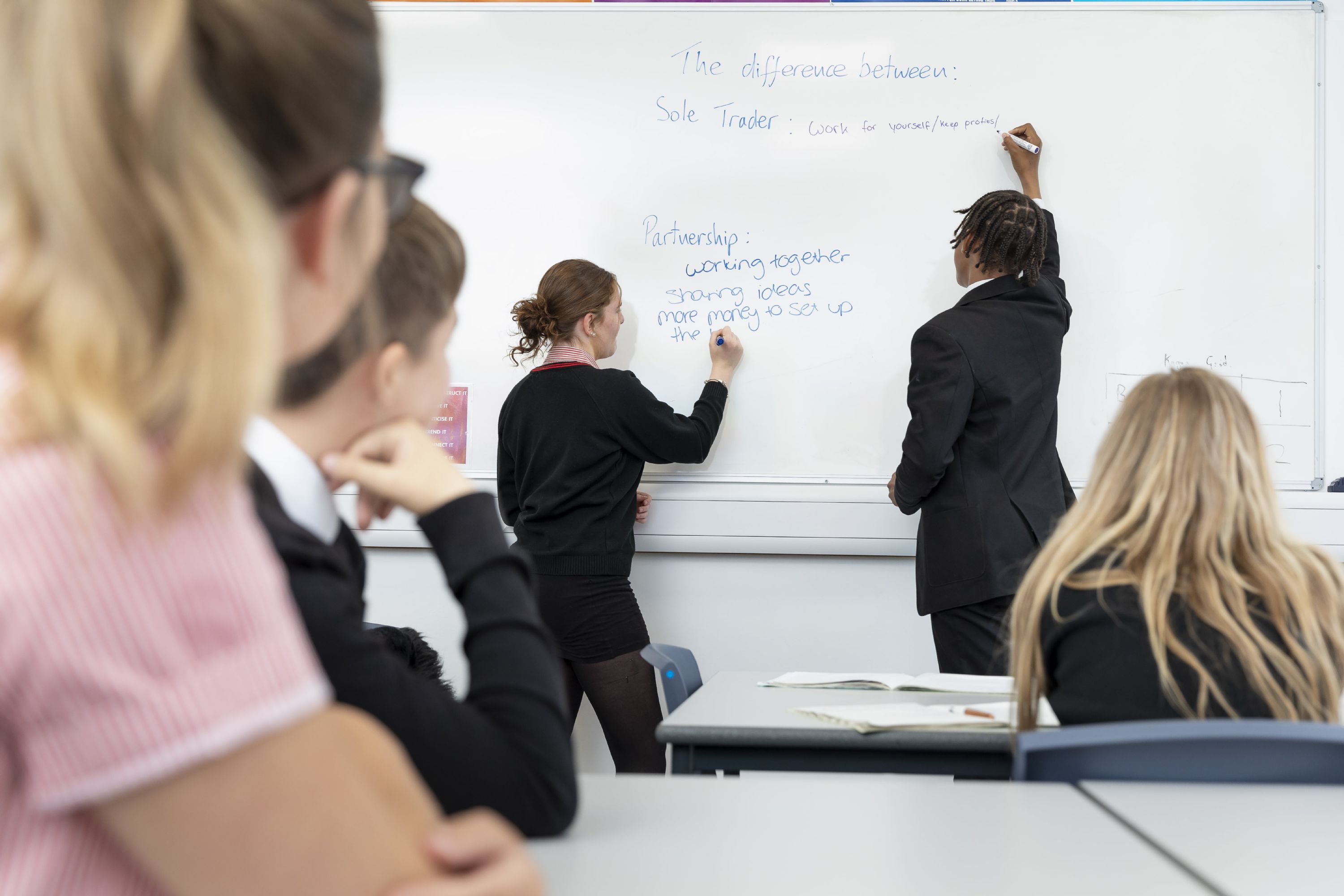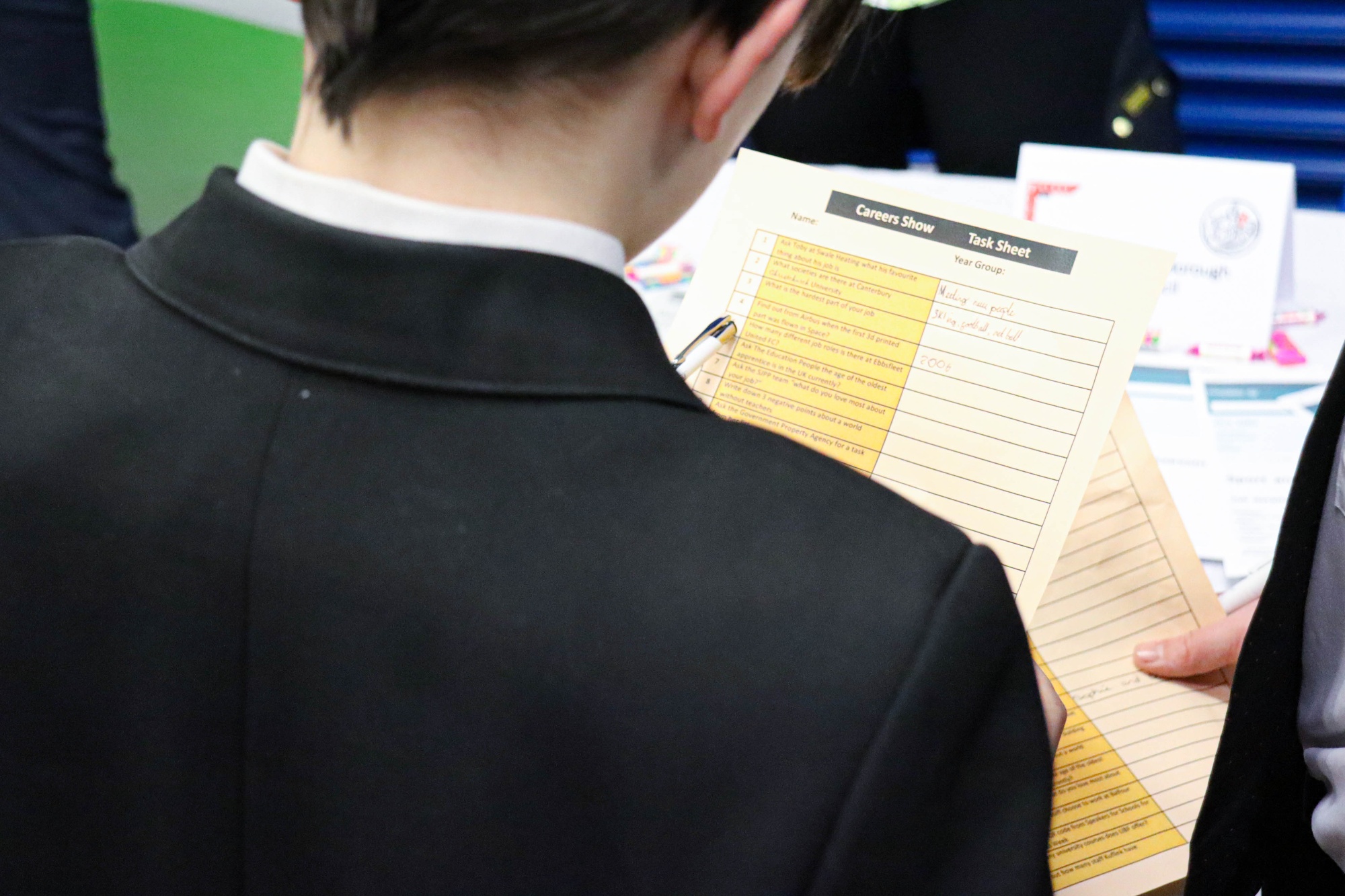Business
Curriculum Leader: Ms C Jordan - jordanc@saintgeorgescofe.kent.sch.uk
Luck is preparation meeting opportunity
oprah winfrey
Do you ever wonder what is required to set up your own business? What product or service to provide? How much to charge the customers? What additional finance would be appropriate? How to calculate your profit or loss? Well, signing up to take Business can provide the answers to these questions and many more.
View our Learning Journey for Business here
Intent
The Business department at Saint George’s C of E School aims to provide pupils with the opportunity to learn about the way in which businesses operate in the real world. In addition to the substantive knowledge gained in business, we aim to equip them in the longer term with employability skills, the ability to take advantage of business opportunities if they arise and resolve business problems to flourish in the future.

Implementation

Pupils develop sound theoretical knowledge using practical business theory and apply it to case studies of real-life businesses using a range of skills including analysis and evaluation. Students visit businesses where possible as well as have opportunities to engage with businesses and entrepreneurs where possible.
Pupils are challenged to work collaboratively and think independently using Kagan when engaging in all lessons and class discussions. Lesson content is engaging, promotes topical discussion and encourages pupils to develop an enquiring mind in relation to business organisations and their operations and to personal and global financial sustainability. Students develop quantitative skills in analysing data where appropriate.
The department provides a knowledge-based curriculum; the substantive knowledge underpins and enables disciplinary aspects of the course.
We ensure that SEND and disadvantaged children are given the necessary support in class to fully access the Curriculum and that equal opportunities are given to all.
Impact
These elements allow students to express themselves in a confident manner and develop presentation, leadership and team working skills, essential to future employment. Students are encouraged to engage in current affairs to understand the influence of political, social, technological, legal and ethical decisions on businesses and their stakeholders.
Pupils are expected to express their decision-making skills using essay writing formats and therefore the course provided allows them to develop generic analytical, critical thinking and evaluation skills.
By the end of Key Stage 4, they will be more able to think independently and analytically, reaching logical evidence-informed conclusions and making reasonable recommendations for change within the business environment.

Business in Key Stage 3 (KS3)
In Year 9 pupils complete taster sessions in both business and finance over one term to understand more about each course and the routes following successful completion to careers to inform their GCSE option decision.
Business in Key Stage 4 (KS4)
Year 10: Students complete Unit 1, Unit 3 and Unit 4.
The first unit provides a basic understanding of what a business is, how it operates, and the essentials of profit-making. Knowing and remembering this substantive content is essential as it underpins learning in all other units in the course. Pupils then go on to learn about the way in which people are utilised by businesses by studying unit 4, Human Resources. Not only is the content easily relatable, but it is also essential for pupils to understand as employees and employers of the future.
Year 11: Students complete Unit 2, Unit 5 and Unit 6.
Students will learn about external influences on business (Unit 2), understand that there are other resources used in businesses, apart from the people who work there and that the management of these resources is crucial to achieving profit over time and understand the way in which external factors (technology, ethics, environmentalism and sustainability, economic trends, legal systems and competition) influence a range of different businesses. The following influences give a sound understanding of marketing (Unit 5). Students find that they have some prior knowledge of promotional techniques from their perspectives as consumers, and therefore find learning about the more complex nature of the topic interesting and enjoy analysing the success of different real-life campaigns. This unit can be more challenging with more analysis of big data to make decisions. Finally, we finish the course on Business Finance which links to all units. Content includes sources of finance and the components of forecasting tools (Break Even Analysis and Cash Flow) and statements (Statement of Financial Position [balance sheet] and Income Statement [trading, profit and loss account]) this also develops pupils’ disciplinary knowledge further (use of the tools to make decisions) and allows them to question profit as being the most important element of sustaining a business enterprise over time.
| Units | Unit Titles |
|---|---|
| 1 | Business in the real world |
| 2 | Influences on business |
| 3 | Business operations |
| 4 | Human resources |
| 5 | Marketing |
| 6 | Finance |
GCSE Assessments
We study the Business GCSE. It is assessed by AQA and is graded 9 to 1. Students have 6 units to study over the 2 years. Students will have to sit two exams in Year 11 (worth 50% each). Both are written-based exams and last for 1hr 45mins each. Each exam has 3 sections – section A involves answering multiple choice questions; for sections, B and C students will be given a case study and some data that they need to analyse and answer questions on.
- Paper 1: Influences of operations and HRM on business activity
- Paper 2: Influences of marketing and finance on business activity
Exam Board: AQA Business
Business Future Paths
Provides progression for those wishing to continue their studies to GCE A Level in Business giving students a firm foundation of business knowledge and understanding; business studies also has some crossover with other subjects like accountancy and economics, which looks at how businesses relate to society and the wider world.
Many business studies students go into management and administration jobs in commercial businesses, and a business studies qualification can also be helpful to get into finance, banking or insurance. But skills in management and marketing are also required in other areas such as charity, social work and local government, while knowledge of the business is also important for consultancy, certain teaching jobs and for financial journalists.
Extra Resources
Revision Materials
GCSE Essential:
CGP: AQA GCSE Business: Revision Guide
AQA Business Knowledge Organisers for each unit (Available on class teams)
AQA GCSE Formula List (Available on class teams)
AQA GCSE Business Key Term Glossary (Available on class teams)
Also available on class teams, are PowerPoints from each lesson, and resource lists of wider websites.
GCSE Desirable:
GCSE Business (2017) - Malcolm Surridge and Andrew Gillespie
